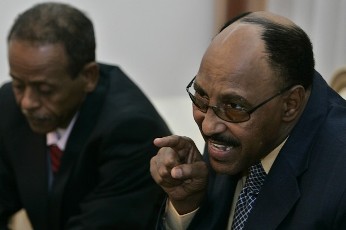Sudanese official says Juba wants to bring border dispute before international justice
June 9, 2012 (KHARTOUM) — South Sudan wants the Addis Ababa talks to fail because they intend to resort to the international arbitration, said Sudanese defense minister and head of the country’s delegation to the security talks in Addis Ababa.

The talks of the Joint Political and Security Mechanism (JPSM) ended without agreement as the South Sudanese delegation said that a buffer zone the parties agreed to establish should be implemented based on a map including ten disputed instead of four previously consented by the two sides.
“South Sudan’s negotiating strategy aims to reach the date determined by UN Security Council without concluding an agreement because they intend to move to the international arbitration,” Abdel Rahim hinted.
The UN resolution 2046, which was adopted on 2 May, gave the two parties three months to reach an agreement over the outstanding issues. It also threatened to impose sanctions if they fail to comply with the decision.
Further the African mediator will be asked to formulate a package of proposals on all the outstanding issues and to presented to the Security Council.
The minister said that juba want s to impose a new reality in the region. He also said the South Sudan negotiating delegation gave an impression they do not have any intention to achieve peace with Sudan.
He further described as hostile the new map of South Sudan which includes for the first time some ten areas as part of the new country.
Juba wants to establish ten new “Abyei” areas, he stressed.
The minister said the only legitimate map they can consider as basis for the talks is the map upon which they signed the Comprehensive Peace Agreement with the SPLM in 2005, and implemented the troops’ redeployment.
South Sudanese officials said in the past that they wanted first to secure the independence of their country before to raise new disputes with Khartoum on areas like Heglig, or Kharasana through the international justice.
They delegations have to resume talks on 19 June.
Abdel Rahim and the interior minister Ibrahim accused the American administration of supporting Juba in its negotiating policy stressing that no peace can be achieved through such expansionist ambitions.
The head of the Sudanese side stressed that Khartoum has no aggressive intentions towards the South Sudan. But warned that “if we have to defend our territory, then it is our duty,” he said.
The AU High Level Implementation Panel (AUHIP) said in a statement put out on Friday evening that the two sides despite their difference on how to implement the demilitarised zone have agreed to cease harboring and supporting rebels opposed to each other’s regimes as well as the unconditional withdrawal of their forces from border regions.
“The JPSM will remain in session through the next weeks, to ensure compliance with the parties’ obligations under the Roadmap,” partly reads the AUHIP statement.
The two countries, it added, also agreed to nominate representatives to activate the Ad Hoc Committee; a body agreed by the parties to deal with allegations and counter allegations between the two States.
The mediation stressed that the two nations also extensively discussed the geographical definition of the Safe Demilitarized Border Zone (SDBZ) and a temporary security line between the two countries.
According to the AUHIP, the parties made substantive progress on this matter with the Government of South Sudan reportedly indicating its acceptance of the AUHIP security and administrative map submitted to the parties in November 2011.
Talks between the two commenced on 29 May, with the first session involving an extraordinary meeting of the Joint Political and Security Mechanism (JPSM).
(ST)
